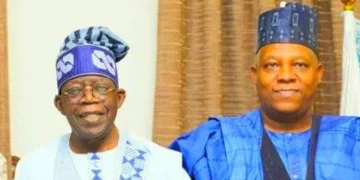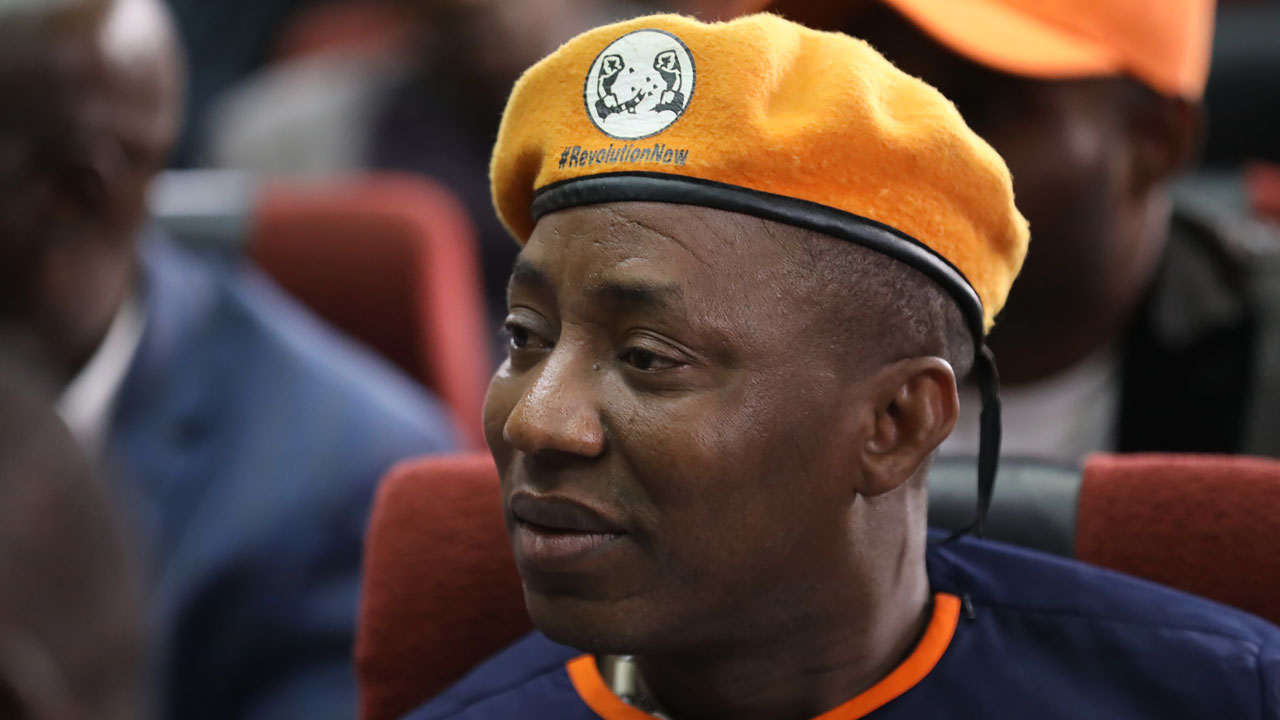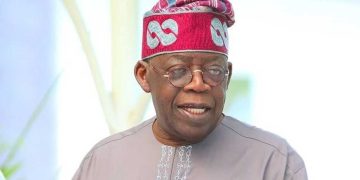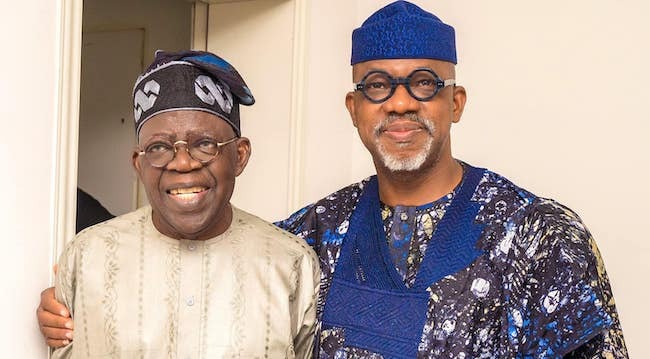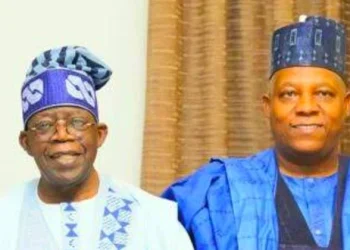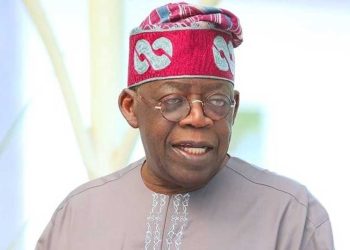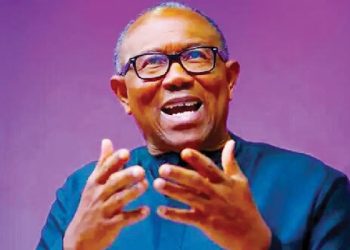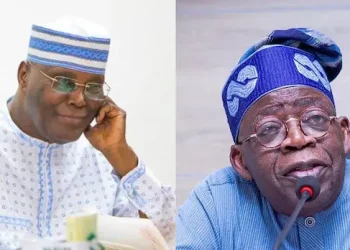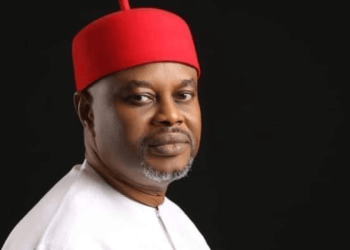What was meant to be a solemn religious ceremony honouring the late Awujale of Ijebuland, Ọba Sikiru Kayọde Adetọna, turned into a politically charged event on Sunday, July 20, 2025, when President Bola Ahmed Tinubu publicly referred to Ogun State Governor Dapo Abiodun as “Oloyinbo” (one who behaves like a white person), claiming the governor “only speaks English.”
The incident occurred during the 8th Day Fidau prayers for the departed Awujale at the traditional ceremony grounds in Ijebu Ode, where political heavyweights from across the Southwest region had gathered to pay their respects.
In what appeared to be a playful but pointed observation, President Tinubu remixed the popular Yoruba phrase “Okanlomo Eleyi” while commenting on Governor Abiodun’s communication style before a gathering of traditional rulers, political dignitaries, and community members.
“This one here only knows how to speak English,” Tinubu said in Yoruba, before adding the “Oloyinbo” moniker that drew chuckles from the predominantly Yoruba-speaking audience.
The President’s remarks, while delivered in a seemingly lighthearted manner, highlight a deeper concern about political disconnect between elected officials and their grassroots constituencies. The “Oloyinbo” label, traditionally used to describe someone who has adopted Western ways at the expense of local culture, suggests a critique of Governor Abiodun’s political approach.
Traditional Rulers Sideline
The ceremony itself became a source of controversy as the State Government was accused of completely hijacking the program that should have been led by traditional authorities. In an unprecedented move that shocked attendees, Ijebu traditional rulers and Chiefs were systematically sidelined from a ceremony meant to honor their own departed monarch.
The most glaring example of this institutional disrespect was the treatment of the Ogbeni Oja, Chief Sonny Kuku, who was not allowed to make a speech at the program despite his significant standing within the Ijebu traditional hierarchy. This exclusion has been widely interpreted as a deliberate slight against the traditional institution and a clear demonstration of the state government’s disregard for customary protocols.
The hijacking of the program represented more than just poor planning—it was seen as a calculated political move that relegated the rightful custodians of Ijebu culture to mere spectators at their own traditional ceremony. Many traditional rulers were visibly uncomfortable with the arrangement, though protocol prevented them from expressing their displeasure publicly.
Silence on State Creation
Perhaps more significantly, Governor Abiodun’s address conspicuously omitted any mention of the creation of Ijebu-Remo State—the greatest expectation of the people and what many attendees had hoped to hear about as a posthumous gift in memory of the late Awujale.
The governor’s silence on this crucial matter has given further confirmation to the long-held notion among locals that Dapo Abiodun has been the primary obstacle standing against the interests of the Ijebu and Remo people regarding state creation.
Many attendees had specifically come to the venue hoping to hear the latest updates on the proposed state creation, viewing it as a fitting tribute to their departed traditional ruler. The absence of any such announcement left the crowd disappointed and reinforced existing suspicions about the governor’s commitment to their cause.
A political analyst from Ogun State suggested that Tinubu’s comments reflect growing concerns about Governor Abiodun’s perceived elitist tendencies and his apparent disconnect from local politics in the state. Critics have long argued that the governor’s preference for English over Yoruba in public addresses, combined with his corporate background, has created a barrier between him and ordinary citizens.
“When a president publicly calls a governor ‘Oloyinbo,’ it’s more than just banter—it’s a subtle indictment of political style,” noted Dr. Kazeem Olukoya, a political scientist and university don. “It suggests that Abiodun may be seen as too removed from the cultural sensibilities of his people.”
Grassroots Reactions
Local residents at the ceremony expressed mixed reactions to the unfolding events. While some laughed off the President’s comments as typical political humor, others saw it as a valid criticism of their governor’s communication style and broader approach to governance.
“Our leaders should be able to speak to us in our language,” said Mama Folasade Adebisi, a trader from Ijebu Ode. “Politics is for everyone, not just the educated ones.”
The sentiment reflects a broader concern about accessibility in political communication, particularly in a region where Yoruba remains the primary language of daily discourse.
Cultural Authenticity
The incident underscores ongoing debates about authenticity in Nigerian politics, where the ability to connect with local communities in indigenous languages is often viewed as a measure of political legitimacy and grassroots appeal.
In Yorubaland, where linguistic and cultural preservation remains a sensitive issue, politicians who cannot effectively communicate in the local language often face questions about their commitment to genuinely representing their constituents’ interests.
As of the time of this report, Governor Abiodun’s office has not yet responded to requests for comment on the President’s remarks or the various allegations surrounding the ceremony’s organisation.
The silence from the governor’s camp may be strategic, as any response risks either escalating the controversy or appearing defensive about legitimate concerns raised by both the President and local community members.
This incident adds another dimension to discussions about political representation and cultural authenticity in contemporary Nigerian governance. It raises important questions about whether political leaders can effectively serve communities whose cultural and linguistic traditions they appear disconnected from.
The controversy also highlights the complex dynamics between federal and state political relationships, particularly when a sitting president publicly critiques a governor from his own political sphere during a solemn traditional ceremony.
As the dust settles from the Awujale’s Fidau prayers, the political reverberations from Sunday’s events are likely to continue shaping discussions about leadership, cultural authenticity, and political representation in Ogun State and beyond.
The incident serves as a reminder that in Nigerian politics, cultural sensitivity and linguistic accessibility remain crucial factors in determining political success and legitimacy, regardless of one’s educational background or professional achievements.

Folami David is a dynamic journalist who views the world through an analytical lens, translating complex narratives across multiple industries into compelling stories. With an insatiable appetite for information and a keen eye for emerging trends, Folami specializes in uncovering the interconnections between technology, business, culture, and society.


